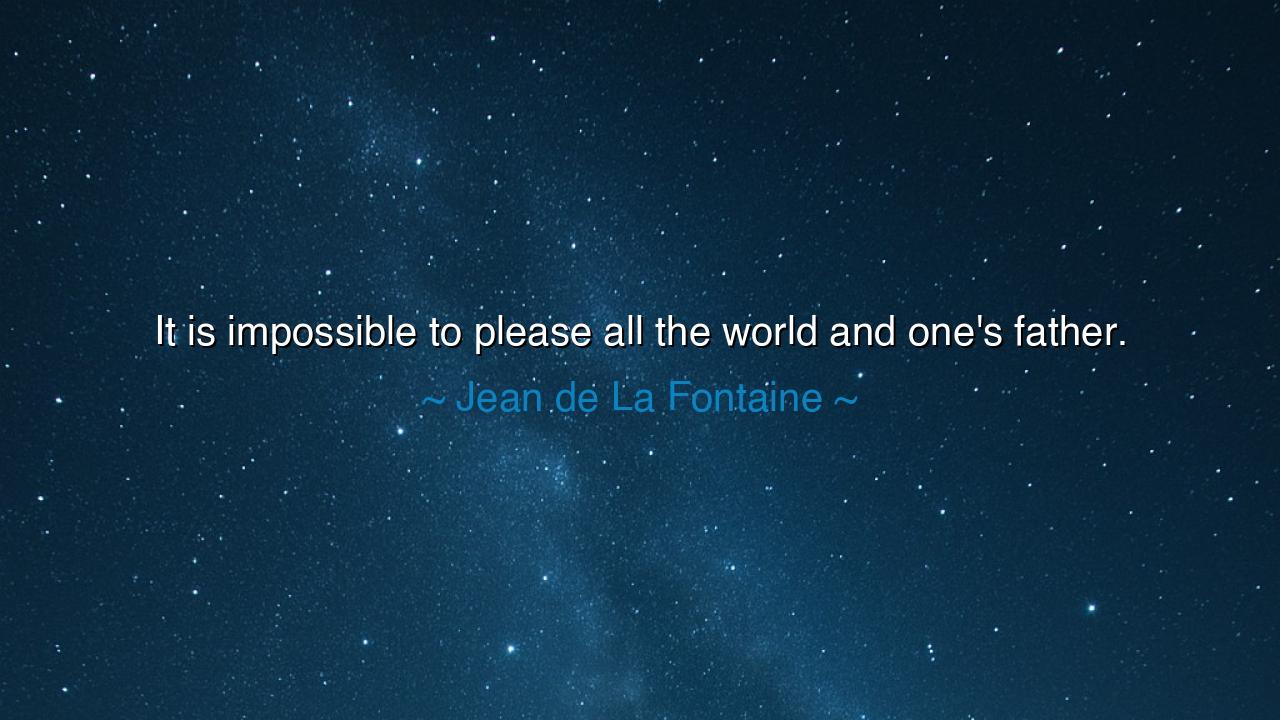
It is impossible to please all the world and one's father.






In the wry and timeless wisdom of Jean de La Fontaine, the great French fabulist, we encounter a truth as old as the human heart: “It is impossible to please all the world and one’s father.” At first glance, this saying sparkles with humor, as many of La Fontaine’s fables do, yet beneath its jest lies a profound meditation on expectation, duty, and individuality. It speaks of the eternal tension between the desire to satisfy others and the deeper call to remain true to oneself. The world demands conformity; the father demands honor. Between the two, the soul must choose the path that preserves its integrity.
The origin of this quote is rooted in La Fontaine’s famous fable, “The Miller, His Son, and the Ass.” In it, a father and son attempt to travel with their donkey while pleasing every onlooker they meet. When they walk beside the animal, people mock them for not riding it. When the son rides, the crowd condemns the father for walking. When the father rides, they accuse him of cruelty toward his child. Finally, when both ride the donkey, they are scorned for overburdening the creature. In their desperation to please everyone, they end by pleasing no one—and, in the moral’s bitter twist, even lose their donkey. Thus, La Fontaine concludes that to seek universal approval is folly, for every soul carries its own judgment, and one cannot satisfy them all.
In his humorous yet piercing way, La Fontaine extends this truth to the relationship between parent and child—the bond that most tests our balance between love and independence. The father, symbol of authority and tradition, represents not merely one man but the weight of expectation, the inherited voice of the past. The world, in contrast, represents society’s shifting gaze, the fickle court of public opinion. To try to please both, says La Fontaine, is to live torn in two directions—to chase approval from those who see with opposite eyes. The father calls for obedience and restraint; the world cries for ambition and daring. How, then, can one soul walk in harmony between such conflicting lights?
History gives us countless mirrors of this struggle. Consider Galileo Galilei, who stood between the love of truth and the authority of his Church—a fatherly figure in the life of his world. He longed for harmony but found himself condemned for his devotion to knowledge. His tragedy was not born of rebellion, but of the impossibility of pleasing both the truth within and the powers without. He chose, in the end, to be faithful to the light of reason rather than the applause of men. So too, La Fontaine teaches us that peace of soul cannot be found in universal approval, but only in fidelity to one’s own conscience.
The quote also speaks to the universal human yearning for acceptance. Each of us is born beneath the gaze of two worlds—the personal and the public. We seek to earn the love of our parents, the respect of our peers, the admiration of strangers. Yet if we make these the measure of our worth, we lose the freedom to be ourselves. To live by others’ praise is to die by their judgment. The wise man learns, as La Fontaine did, that harmony is not found in pleasing all, but in acting from truth. Better to live misunderstood with integrity than celebrated in pretense.
And yet, there is tenderness in La Fontaine’s irony. For though he warns us that we cannot please both “the world and one’s father,” he does not tell us to forsake either love or respect. His lesson is balance, not rebellion. A father’s guidance is a lamp, not a chain; the world’s opinion, a mirror, not a master. We must listen to both, but serve neither blindly. The true art of living lies in discerning when to yield and when to stand firm—when to honor tradition, and when to follow the quiet command of the heart.
So, let this wisdom be carried forward like a torch through the generations: You cannot please everyone, but you can live truthfully. Seek not to silence all voices, but to strengthen your own. Take counsel from your elders, but let your steps be guided by conscience. Be kind, but not compliant; humble, but not enslaved. The applause of the world fades with the wind, and even the approval of the father must one day give way to the calling of your own destiny.
For, as La Fontaine reminds us, the attempt to please all leads to emptiness, while the courage to walk your path—even with disapproval at your back—leads to peace. So walk firmly, speak honestly, and act with love. And if you must choose between pleasing the world and remaining true to yourself, remember this: no one ever found joy in trying to be what others demanded—but only in becoming who they were meant to be.






AAdministratorAdministrator
Welcome, honored guests. Please leave a comment, we will respond soon